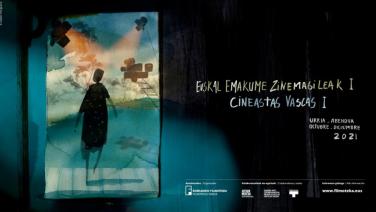A proposal which will be developed over at least three years and which seeks to shed light on the talent of Basque female filmmakers.

The Basque Film Archive's programming usually dedicates the last quarter of each year to Basque film. This time, the proposed season has significant peculiarities. It is a proposal which will be developed over at least three years and which seeks to shed light on the talent of Basque female filmmakers who have filmed at least one feature-length film during their careers. The films will be screened in the three capitals of the Basque Autonomous Community: in Tabakalera (Donostia/San Sebastian), the Bilbao Fine Arts Museum and in Artium (Vitoria-Gasteiz). Thus, Artium becomes another venue for the Basque Film Archive's programming and our stable programme now covers the three territories of the Basque Autonomous Community for the first time in the history of the institution. The multi-year season will soon be accompanied by a publication that is being coordinated by professor María Pilar Rodríguez. The poster for the season has been designed and made by filmmaker Isabel Herguera.
In order to put together the film season, the curatorial proposal is the following: each filmmaker freely chooses the film from their career they want to exhibit and they are invited to present it to the audience and debate with them. Some of the pioneers of our filmmaking will be the protagonists of this first season. Thus, we can watch Urte ilunak (Arantxa Lazkano, 1993), a poetic approach to Francoist repression in the Basque Country, a topic shared with Denboraren gibelean (Mirentxu Purroy), also from a child's perspective and dealing with the persecution of the Basque language. Three documentary approaches address problems that are still alive in the present day: the cinematographic memory of the Civil War and Franco's dictatorship in Kamarada (Julia Juániz, 2013), the firm commitment to peace by women in a Basque Country gripped by the tension caused by multiple types of violence in Mariposas en el hierro (Bertha Gaztelumendi, 2012) or the drama of the refugees at the gates of a reluctant Europe filmed by Helena Taberna (Varados, 2019). As an example of the multiple offerings of this first season: a literary adaptation of Bernardo Atxaga with echoes of a political conflict in the hands of female director Aizpea Goenaga (Zeru horiek, 2005), a comedy in the shape of a reunion of female childhood friends (Erlauntza, Mireia Gabilondo, 2020) and a children's animated film that teaches values directed by Maite Ruiz de Austri in Lucius Dumben berebiziko bidaia (2013).
Finally, a special session by the Basque Film Archive (this time in collaboration with Elías Querejeta Zine Eskola) seems to want to embed itself with particular coherence in this three-month programme: two films by the “insumusas” (“rebel muses”) and feminists Carole Roussopoulos and Ioana Wieder, focusing on the protagonism of Basque and feminine resistance against Francoism (Mères espagnoles and La marche des femmes à Hendaye, 1975).
